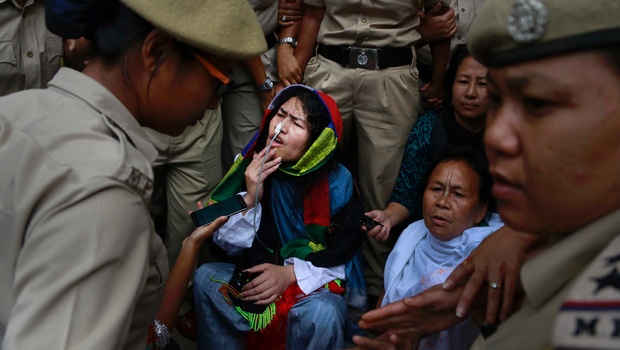IMPHAL (AP): Sixteen years since she started her indefinite hunger strike demanding the repeal of the controversial Armed Forces (Special Powers) Act (AFSPA) after 10 innocent civilians were gunned down allegedly by the Assam Rifles, Manipur’s iconic rights activist Irom Sharmila broke the fast on Tuesday by taking a sip of water and honey.
The Armed Forces Special Powers Act is in effect in Indian-ruled Kashmir and in a number of northeastern areas facing separatist insurgencies. The law gives security forces the right to shoot to kill suspected rebels without fear of possible prosecution and to arrest suspected militants without warrants. It also gives police wide-ranging powers of search and seizure.
The act prohibits soldiers from being prosecuted for alleged rights violations except with express permission from the federal government. Such prosecutions are rare.
Manipur, like some other parts of the northeast, faces unrest from separatist militant groups fighting for ethnic enclaves or independent states. Most northeasterners are ethnically more tied to China or Myanmar than they are to most of India.
Shamila broke her fast before the media at the Jawaharlal Nehru Institute of Medical Sciences (JNIMS), where she had been lodged for the past many years. Her bringing an end to the fast came around two and half hours after she had been granted bail by a local court on a PR bond of Rs.10000 at the end of a three-hour long hearing.
The court asked her for reappearance on August 23.
In the evening escorted by the police, she went to the residence of her acquaintance one Dr. Suresh but as the locals protested her presence there, the police took her to the office of city police. She was there at the time of filing this report.
Earlier, talking to the media at JNIMS, Sharmila appealed to people not to misconstrue her decision about joining politics insisting that else the much-longed-for change could never be achieved.
“I want to become the chief minister of Manipur to bring positive changes. People think that I have no desire and that I am a symbol of resistance but this is my life and my choice,” she said about her decision to get married.
She has been in a relationship with a Goa-born British national Desmond Coutinho, who is a writer-activist, for the past few years. He was not in Manipur on Tuesday.
Sharmila said she was no goddess but would continue to shower her blessings on people. “I want equality. I am a normal human being and love is my personal mater and it is natural,” the world’s longest hunger striker said.
Stating that she did not have higher educational qualifications, Sharmila said she had little knowledge about politics and that she would not join any political party even if approached, saying that she would contest next year’s Manipur elections as an independent. She refused to comment on the futility of her “satyagraha”.
Sharmila said she would not meet her octogenarian mother, Sakhi Devi, till she achieved her goal. She said she would move to an ashram and stay there.
“People killed (Mahatma) Gandhi and Jesus Christ. They fought for truth and justice…For Kashmir and Manipur, I believe self-determination is the best way,” she said. “Let them kill me,” she said about the threat to her life issued by the insurgents. “I am a real embodiment of revolution,” she asserted.
Claiming that there is no real democracy in Manipur, she said it was the society, not politics, which was dirty.
She also had a message for Prime Minister Narendra Modi. “The Prime Minister always indulges in violence. He should run the country with fatherly affection,” she said.



























































